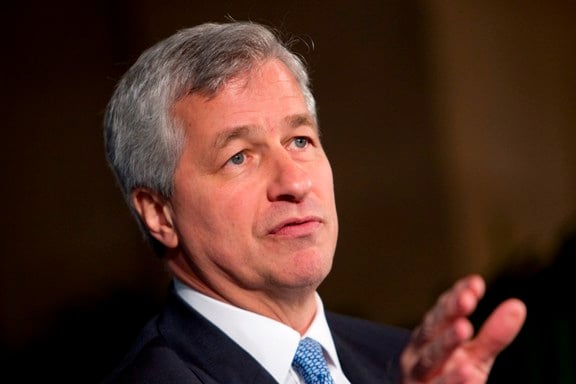

JPMorgan Chase & Co. Chief Executive Officer Jamie Dimon said a recession is a “likely outcome” of the turmoil tied to President Donald Trump’s tariffs.
“No one’s wishing for that but hopefully, if there is one, it’ll be short,” Dimon said Wednesday on Fox Business. “Fixing these tariff issues and trade issues would be a good thing to do.”
Dimon said that, while he hasn’t seen an uptick in defaults yet, he expects them. “We haven’t had any slowdown or real recession — Covid was so short I almost don’t include it — in so long that if you have rates going up a little bit and inflation is sticky and credit spreads are gapping out, which they’re going to, I think you’ll see more credit problems than people have seen in a long time,” he said.
In his annual shareholder letter released Monday, Dimon urged a quick resolution to uncertainties tied to the tariffs “because some of the negative effects increase cumulatively over time and would be hard to reverse.”
Trump announced the steepest tariffs in a century last week, including a 10% “baseline” charge for all exporters to the US and additional “reciprocal” rates on dozens of others that the administration identified as having high barriers to US goods. Markets dove in response, and some economists have predicted a recession in the US this year.
Dimon said Wednesday that “it is perfectly reasonable for someone to say that trade was unfair,” and that showing progress on trade deals is the best thing the Trump administration can do to calm markets.
The CEO said he has seen business sentiment change a bit and expects companies to pull back on expenses. His own firm put some headcount controls in place — “not forcing people to cut, I call this going for your run and eating your spinach.”
JPMorgan has already lost “a couple” of bond deals tied to the tariff uncertainty, with companies opting for local banks instead, Dimon said. He warned that the tumult shouldn’t go on for too long because “it’s causing cumulative damage including huge anger at the United States.”
While volatility is generally good for banks’ trading businesses, it hurts capital-markets businesses as companies put off equity and debt issuance and mergers and acquisitions. Initial public offerings “are being canceled, a couple of hung deals out there in the high-yield land and bridge loans, and that just slows everything down and so that’s the bad part of these volatile markets,” Dimon said.

Chasing productivity is one thing, but when you're cutting corners, missing details, and making mistakes, it's time to take a step back.

It is not clear how many employees will be affected, but none of the private partnership’s 20,000 financial advisors will see their jobs at risk.

The historic summer sitting saw a roughly two-thirds pass rate, with most CFP hopefuls falling in the under-40 age group.

"The greed and deception of this Ponzi scheme has resulted in the same way they have throughout history," said Daniel Brubaker, U.S. Postal Inspection Service inspector in charge.

Elsewhere, an advisor formerly with a Commonwealth affiliate firm is launching her own independent practice with an Osaic OSJ.
Stan Gregor, Chairman & CEO of Summit Financial Holdings, explores how RIAs can meet growing demand for family office-style services among mass affluent clients through tax-first planning, technology, and collaboration—positioning firms for long-term success
Chris Vizzi, Co-Founder & Partner of South Coast Investment Advisors, LLC, shares how 2025 estate tax changes—$13.99M per person—offer more than tax savings. Learn how to pass on purpose, values, and vision to unite generations and give wealth lasting meaning
